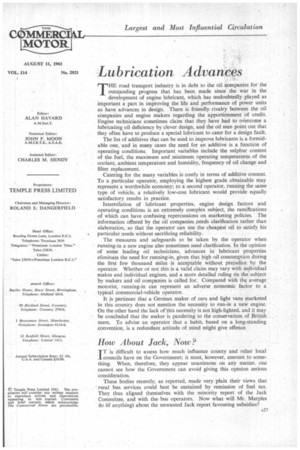Lubrication Advances
Page 29

If you've noticed an error in this article please click here to report it so we can fix it.
THE road transport industry is in debt to the oil companies for the outstanding progress that has been made since the war in the development of engine lubricant, which has undoubtedly played as important a part in improving the life and performance of power units as have advances in design. There is friendly, rivalry between the oil companies and engine makers regarding the apportionment of credit. Engine technicians sometimes claim that they have had to overcome a lubricating oil deficiency by clever design, and the oil men point out that they often have to produce a special lubricant to cater for a design fault.
The list of additives that can be used to improve lubricants is a formidable one, and in many cases the need for an additive is a function of operating conditions. Important variables include the sulphur content of the fuel, the maximum and minimum operating temperatures of the coolant, ambient temperature and humidity, frequency of oil change and filter replacement. .
Catering for the many variables is costly in terms of additive content. To a particular operator, employing the highest grade obtainable may represent a worthwhile economy; to a second operator, running the same type of vehicle, a relatively low-cost lubricant would provide equally satisfactory results in practice.
Interrelation of lubricant properties, engine design factors and operating conditions is an extremely complex subject, the ramifications of which can have confusing repercussions on marketing policies. The information offered by the oil companies heeds clarification rather than elaboration, so that the operator can use the cheapest oil to satisfy his , particular needs without sacrificing reliability.
The measures and safeguards to be taken by the operator when running-in a new engine also sometimes need clarification. In the opinion of some leading oil technicians, advances in lubricant properties eliminate the need for running-in, given that high oil consumption during the first few thousand miles is acceptable without prejudice by the operator. Whether or not this is a valid claim may vary with individual makes and individual engines, and a more detailed ruling on the subject by makers and oil companies is called for. Compared with the average motorist, running-in can represent an adverse economic factor, to a typical commercial-vehicle operator.
It is pertinent that a German maker of cars and light vans marketed in this country does not mention the necessity to run-in a new engine. On the other hand the lack orthis necessity is not high-lighted, and it may be concluded that the maker is pandering to the conservatism of British users. To advise an operator that a habit, based on a long-standing convention, is a redundant attitude of mind might give offence.




















































































































